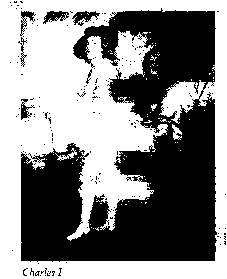
42
the cellar, and concealed a nice fat charge of gunpowder in the coal bin. Unfortunately for the leader, one of
the conspirators warned a certain Lord by letter to stay away from a meeting at the House on the day set for the
explosion. This led to the discovery of the plot and Guy Fawkes was tortured and hanged. On this day it is
customary in England to dress up like Americans do on Halloween, and to carry an effigy of Fawkes through
the streets and then to bum it.
"Remember, Remember,
the 5th of November,
The Gunpowder Treason
andPlot." – goes a well-known rhyme.
The King was noted for persecuting witches and writing books, principally about the devine rights of Kings.
James was closely connected with the international catholic reactionary powers.
The first Stewarts had faced the alternative: either to give up absolute power and cooperate with new
gentlemen and bourgeoisie or to support reactionary noblemen.
They preferred to struggle against the puritans, representatives of new revolutionary ideology.
James I, and later his son Charles I were extravagant and wasteful.
Charles I Stuart (1625-1649) was in a constant conflict with Parliament.
The Parliament, when convened, refused to give the King financial support, and Charles I ruled for 11 years
without Parliament (1629-1640). That Period of Personal Government, during which the King did not receive
the usual financial aid and had to raise money as best as he could: pawned Crown Jewels, gave out honours,
etc.; came to an end when he became involved in a war with Scotland for which he couldn't pay.
The King (Charles I) was forced to convene a meeting of the Great Council and later to call a Parliament.
And he had to concede to this Parliament almost all that it ashed, so badly he was in need of money. Later
his attempts to go back on his word and revoke his concessions and his refusal to hand over to Parliament
control of the Army brought about the Civil War which his policy and that of his father had made inevitable.

